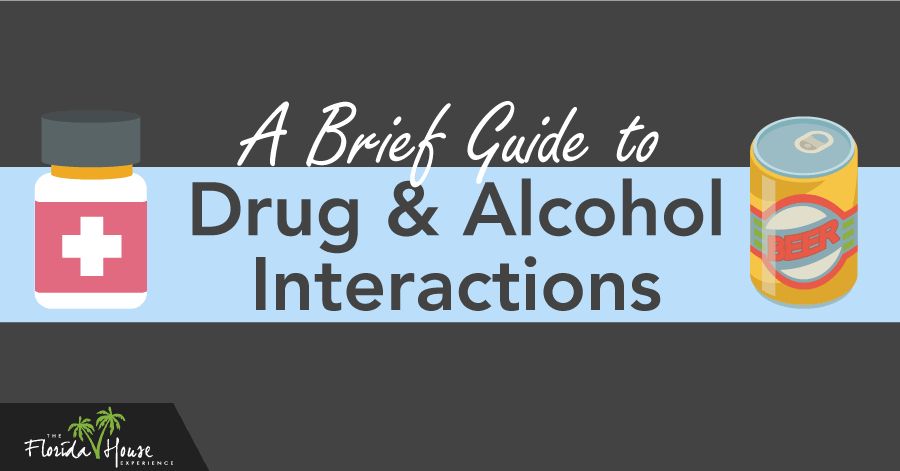
Often when we talk about abusing drugs, we discuss the drug itself: the effects of taking it, the potential for addiction, and the physical danger that comes about over a long period of abuse, whether addiction sets in or not.
We talk less often about mixing drugs with other addictive substances. Sure, there are popular combinations that we discuss when framing the topic of overdose deaths. For example, fentanyl mixed with other drugs such as cocaine or other opiates has become a leading cause of drug-related death in recent years. In the 1980s, lacing marijuana cigarettes with PCP or acid led to a scourge of hospitalizations and deaths. But these are discussed because of their “popularity” in a given time period.
Here, we want to talk about different classes of drugs and how they mix with one of the most commonly consumed substances worldwide: alcohol.
Why Mix Alcohol and Drugs?
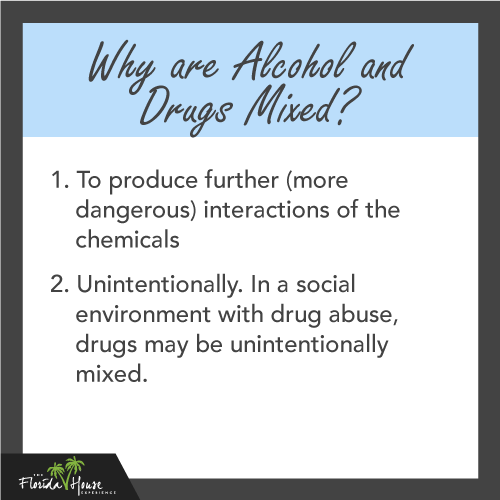 For the most part, people mix drugs and alcohol for two key reasons, sometimes at the same time:
For the most part, people mix drugs and alcohol for two key reasons, sometimes at the same time:
One is to enhance the sensations of the drugs. Alcohol and drugs often produce effects through different neural pathways than each other, meaning that the existence of one rarely competes with the other. The result is an enhanced sensation when both substances are used simultaneously.
The second reason is not so deliberate and has to do with the instances in which drug use tends to occur. People often use drugs in times of social activity or recreation, using depressants like opiates and marijuana, for example, to relax, or using stimulants like amphetamines to extend a night out or be more social. In these instances, drug use is obviously taking place, but these are also situations where alcohol consumption is common. Often, people who mix drugs and alcohol don’t do it deliberately to enhance the experience, but simply due to their environment.
Drug and Alcohol Interactions and Danger
Simply put, mixing drugs and alcohol is never safer than using one or the other on their own. Here is a breakdown of different categories of illicit drugs and how they mix with alcohol:
Opiates
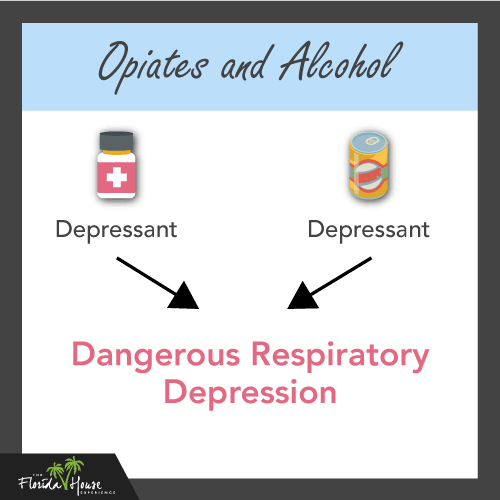 It’s common to mix opiates — morphine, heroin, fentanyl, and prescription pain relievers like Vicodin and Percocet — with alcohol because the way they react to each other and enhance the high that the user gets. Mixing these drugs is popular because they don’t clash: they are both depressants, meaning that the addition of either further extends the calming, sedating, and often dissociating feelings.
It’s common to mix opiates — morphine, heroin, fentanyl, and prescription pain relievers like Vicodin and Percocet — with alcohol because the way they react to each other and enhance the high that the user gets. Mixing these drugs is popular because they don’t clash: they are both depressants, meaning that the addition of either further extends the calming, sedating, and often dissociating feelings.
The problem is that alcohol not only enhances the sensations associated with using opiates, but it also enhances the dangers. An overdose of opiates occurs when the respiratory system is depressed to the degree that the user stops breathing. Alcohol stimulates this effect so that taking less of the opiate in question produces more serious effects.
One common mix of opiates and alcohol is the drink known as “lean” which typically involves consuming codeine cough syrup, soda, and alcohol. Cases exist all over the US of overdoses on this and other mixes. For example, a Staten Island resident overdosed on codeine after drinking this mix, commonly seen in pop culture, and spent 40 days in a coma.
Stimulants
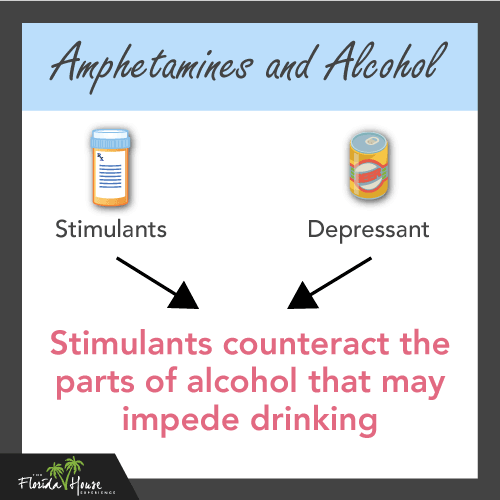 It’s common to see prescription stimulants taken together with alcohol, the main culprit being Adderall, a medication prescribed for attention deficit disorders and is in the amphetamine family. While many Adderall users use the drug as directed, it’s become common for college students to misuse the stimulant. It’s often used without a prescription as a study aid because the drug helps users focus. Because of its stimulant effects, Adderall (as well as Vyvanse, Ritalin, and more) is also used as a “party aid.”
It’s common to see prescription stimulants taken together with alcohol, the main culprit being Adderall, a medication prescribed for attention deficit disorders and is in the amphetamine family. While many Adderall users use the drug as directed, it’s become common for college students to misuse the stimulant. It’s often used without a prescription as a study aid because the drug helps users focus. Because of its stimulant effects, Adderall (as well as Vyvanse, Ritalin, and more) is also used as a “party aid.”
These drugs keep users awake and alert longer when drinking alcohol, which naturally shuts the systems of the body down as more and more is consumed. Much like the caffeine and alcohol mix in drinks like Four Loko (which was later banned and reformulated because of this danger) Adderall makes users able to drink more and for a longer time by counteracting the effects of the alcohol.
One of the main risks of mixing stimulants and alcohol is the onset of alcohol poisoning. Since Adderall dulls the effect of depressants, the user may consume more to get the same effects, increasing the risk of consuming an unsafe amount. Combining alcohol and prescription stimulants can also increase the user’s risk for heart and liver problems, according to the National Institute on Alcohol Abuse and Alcoholism.
Mixing cocaine with alcohol is also popular, and can cause serious risk of organ damage and overdose, as well.
Benzodiazepines
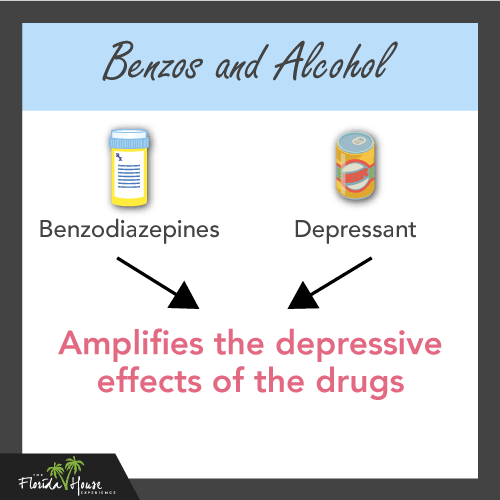 These prescription drugs, also known as “benzos” are commonly prescribed for patients suffering from anxiety because they depress the nervous system and relax the user. Each member of this family of drugs has a slightly different effect, but the most popular and widely prescribed are Xanax, Valium, and Klonopin.
These prescription drugs, also known as “benzos” are commonly prescribed for patients suffering from anxiety because they depress the nervous system and relax the user. Each member of this family of drugs has a slightly different effect, but the most popular and widely prescribed are Xanax, Valium, and Klonopin.
When abused, these drugs are sometimes used socially, for a high, or as a way to escape from the stresses of daily life. This makes them popular among a younger group of users — high school and college students.
These are the groups that commonly mix benzos with alcohol as well. A Huffington Post article from October 2018 shone a spotlight on the number of teens and young adults using benzos recreationally and mixing them with other substances like opiates and alcohol.
Mixing drugs like Xanax and alcohol amplifies the depressive effects of the drugs, so that, much like mixing opiates with alcohol, overdose sets in before the user has a chance to realize what’s happening.
Another issue with these trends occurring is that they’re happening in social groups of younger people. Studies have suggested that the earlier that a person is exposed to addictive substances, the more likely they are to develop addiction over time.
Why Mixing Drugs and Alcohol is So Dangerous
The mixing of various drugs with alcohol consumption isn’t just dangerous immediately, it’s dangerous over the long-term as well. These reckless habits with illegal and addictive substances are more likely to cause addiction the longer they occur. Mixing and abusing drugs is leading to more overdoses and creating more addicts as it continues to be a popular practice.
If you struggle with drug abuse, seek help before you put yourself in serious danger. To learn more, contact FHE Health today.






